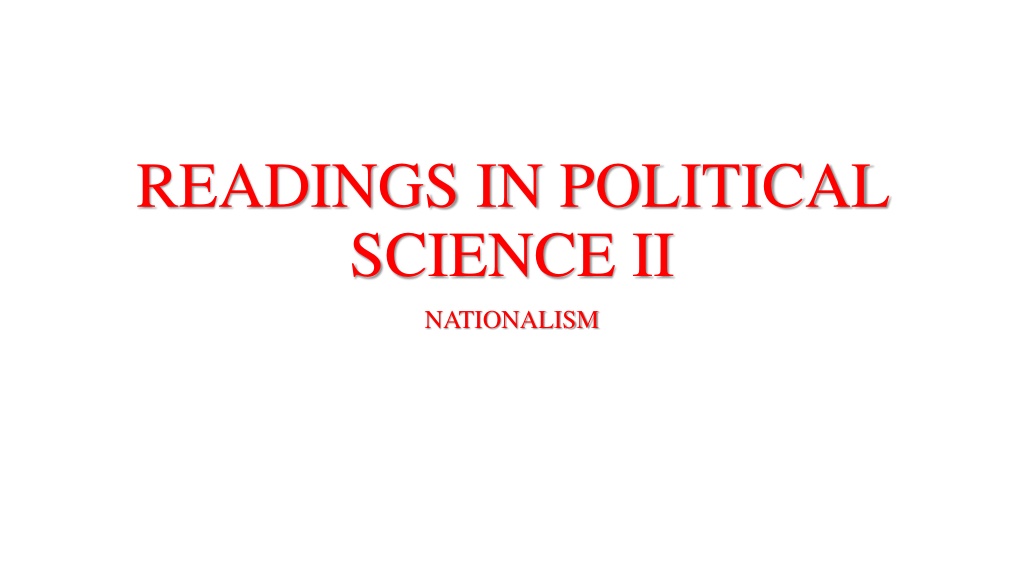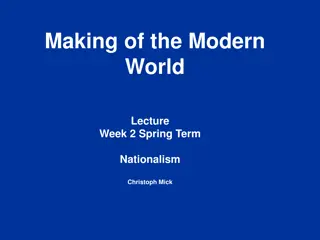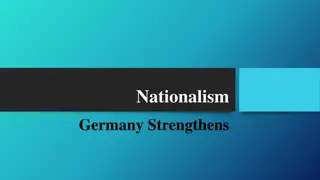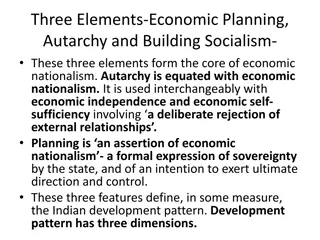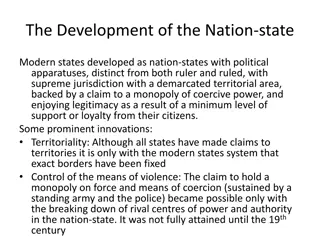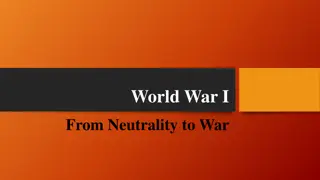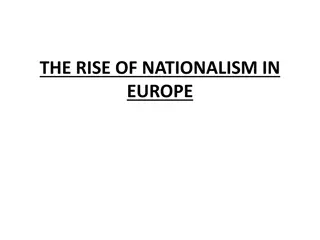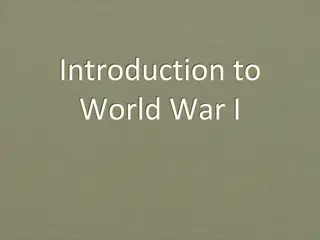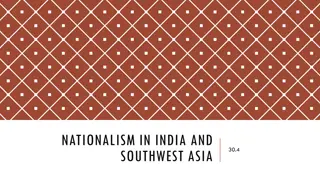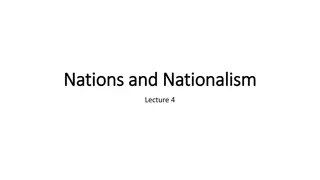Understanding Nationalism in Political Science
Nationalism, a complex concept, defines the nation as the fundamental unit of political rule. It encompasses a mix of objective and subjective factors, including cultural, ethnic, and political traits. The definition of a nation is subjective, based on how its members perceive themselves as a distinctive political community. The two influential views on nationalism relate to cultural and political ties, shaping different forms of nationalist ideologies.
Download Presentation

Please find below an Image/Link to download the presentation.
The content on the website is provided AS IS for your information and personal use only. It may not be sold, licensed, or shared on other websites without obtaining consent from the author. Download presentation by click this link. If you encounter any issues during the download, it is possible that the publisher has removed the file from their server.
E N D
Presentation Transcript
READINGS IN POLITICAL SCIENCE II NATIONALISM
For the last 200 years the nation has been regarded as the most appropriate (and perhaps the only proper) unit of political rule. Indeed, international law is largely based on the assumption that nations, like individuals, have inviolable rights, notably the right to political independence and self-determination. The term 'nation' tends to be used with little precision, and is often used interchangeably with terms such as state, country, ethnic group and race. The United Nations, for instance, is clearly misnamed, as it is an organization of states, not one of national populations.
The difficulty of defining the term 'nation' springs from the fact that all nations comprise a mixture of objective and subjective features, a blend of cultural and political characteristics. In objective terms, nations are cultural entities: groups of people who speak the same language, have the same religion, are bound by a shared past, and so on. Such factors undoubtedly shape the politics of nationalism. The nationalism of the Qu becois in Canada, for instance, is based largely on language differences between French-speaking Quebec and the predominantly English-speaking rest of Canada. Nevertheless, it is impossible to define a nation using objective factors alone. All nations encompass a measure of cultural, ethnic and racial diversity.
This emphasizes the fact that, ultimately, nations can only be defined subjectively by their members. In the final analysis, the nation is a psycho- political construct. What sets a nation apart from any other group or collectivity is that its members regard themselves as a nation. What does this mean? A nation, in this sense, perceives itself to be a distinctive political community. This is what distinguishes a nation from an ethnic group. An ethnic group undoubtedly possesses a communal identity and a sense of cultural pride, but, unlike a nation, it lacks collective political aspirations. These aspirations have traditionally taken the form of the quest for, or the desire to maintain, political independence or statehood. On a more modest level, however, they may consist of a desire to achieve a measure of autonomy, perhaps as part of a federation or confederation of states.
Two contrasting concepts have been particularly influential. One portrays the nation as primarily a cultural community, and emphasizes the importance of ethnic ties and loyalties. The other sees it essentially as a political community, and highlights the significance of civil bonds and allegiances. These rival views not only offer alternative accounts of the origins of nations, but have also been linked to very different forms of nationalism.
Cultural nationalism commonly takes the form of national self-affirmation; it is a means through which a people can acquire a clearer sense of its own identity through the heightening of national pride and self-respect. This is demonstrated by Welsh nationalism, which focuses much more on attempts to preserve the Welsh language and Welsh culture in general than on the search for political independence. Black nationalism in the USA, the West Indies and many parts of Europe also has a strong cultural character. Its emphasis is on the development of a distinctively black consciousness and sense of national pride, which, in the work of Marcus Garvey (see p. 169) and Malcolm X (1926-65), was linked to the rediscovery of Africa as a spiritual and cultural 'homeland'. A similar process can be seen at work in modern Australia and, to some extent, New Zealand. The republican movement in Australia, for example, reflects the desire to redefine the nation as a political and cultural unit separate from the UK. This is a process of self-affirmation that draws heavily upon the Anzac myth, the relationship with indigenous peoples, and the rediscovery of a settler folk culture.
The view that nations are essentially political entities, on the other hand, emphasizes civic loyalties and political allegiances rather than cultural identity. The nation is thus a group of people who are bound together primarily by shared citizenship, regardless of their cultural, ethnic and other loyalties. This view of the nation is often traced back to the writings of Jean-Jacques Rousseau, sometimes seen as the 'father' of modern nationalism. Although Rousseau did not specifically address the nation question, or discuss the phenomenon of nationalism, his stress on popular sovereignty, expressed in the idea of the 'general will' (in effect, the common good of society), was the seed from which nationalist doctrines sprang during the French Revolution of 1789.
In proclaiming that government should be based upon the general will, Rousseau developed a powerful critique of monarchical power and aristocratic privilege. During the French Revolution, this principle of radical democracy was reflected in the assertion that the French people were 'citizens' possessed of inalienable rights and liberties, no longer merely 'subjects' of the crown. Sovereign power thus resided with the 'French nation'. The form of nationalism that emerged from the French Revolution therefore embodied a vision of a people or nation governing itself, and was inextricably linked to the principles of liberty, equality and fraternity.
The idea that nations are political, not ethnic, communities has been supported by a number of theories of nationalism. Eric Hobsbawm (1983), for instance, highlighted the degree to which nations are 'invented traditions'. Rather than accepting that modern nations have developed out of long- established ethnic communities, Hobsbawm argued that a belief in historical continuity and cultural purity was invariably a myth, and, what is more, a myth created by nationalism itself. In this view, nationalism creates nations, not the other way round. A widespread consciousness of nationhood (sometimes called popular nationalism) did not, for example, develop until the late nineteenth century, perhaps fashioned by the invention of national anthems and national flags, and the extension of primary education.
Benedict Anderson (1983) also portrayed the modern nation as an artefact, in his case as an 'imagined community'. Within nations, individuals only ever meet a tiny proportion of those with whom they supposedly share a national identity. If nations exist, they exist as imagined artifices, constructed for us through education, the mass media and a process of political socialization. Whereas in Rousseau's view a nation is animated by ideas of democracy and political freedom, the notion that nations are 'invented' or 'imagined' communities has more in common with the Marxist belief that nationalism is a species of bourgeois ideology. From the perspective of orthodox Marxism, nationalism is a device through which the ruling class counters the threat of social revolution by ensuring that national loyalty is stronger than class solidarity, thus binding the working class to the existing power structure.
A 'political' nation is one in which citizenship has greater political significance than ethnic identity; not uncommonly, political nations contain a number of ethnic groups, and so are marked by cultural heterogeneity. The UK, the USA and France have often been seen as classic examples of political nations. The UK is a union of what, in effect, are four 'cultural' nations: the English, the Scottish, the Welsh and the Northern Irish (although the latter may comprise two nations, the Protestant Unionists and the Catholic Republicans). Insofar as there is a distinctively British national identity, this is based on political factors such as a common allegiance to the Crown, respect for the Westminster Parliament, and a belief in the historic rights and liberties of the British people.
As a 'land of immigrants', the USA has a distinctively multiethnic and multicultural character, which makes it impossible for it to construct a national identity on the basis of shared cultural and historical ties. Instead, a sense of American nationhood has been consciously developed through the educational system, and through the cultivation of respect for a set of common values, notably those outlined in the Declaration of Independence and the US Constitution. Similarly French national identity is closely linked to the traditions and principles of the 1789 French Revolution.
What such nations have in common is that, in theory, they were founded upon a voluntary acceptance of a common set of principles or goals, as opposed to an existing cultural identity. It is sometimes argued that the style of nationalism that develops in such societies is typically tolerant and democratic. If a nation is primarily a political entity, it is an inclusive group, in that membership is not restricted to those who fulfil particular language, religious, ethnic or suchlike criteria. Classic examples are the USA, with its image as a 'melting pot' nation, and the 'new' South Africa, seen as a 'rainbow society'. On the other hand, political nations may at times fail to experience the organic unity and sense of historical rootedness that is found in cultural nations. This may, for instance, account for the relative weakness of specifically British nationalism in the UK, by comparison with Scottish and Welsh nationalism.
Developing world states have encountered particular problems in their struggle to achieve a national identity. Such nations can be described as 'political' in two senses. First, in many cases, they have achieved statehood only after a struggle against colonial rule. In this case, the nation's national identity is deeply influenced by the unifying quest for national liberation and freedom. Third world nationalism therefore tends to have a strong anticolonial character. Second, these nations have often been shaped by territorial boundaries inherited from their former colonial rulers.
This has particularly been the case in Africa. African 'nations' often encompass a wide range of ethnic, religious and regional groups that are bound together by little more than a shared colonial past. In contrast to the creation of classic European cultural nations, which sought statehood on the basis of a preexisting national identity, an attempt has been made in Africa to 'build' nations on the foundations of existing states. However, the resulting mismatch of political and ethnic identities has bred recurrent tensions, as has been seen in Nigeria, Sudan Rwanda and Burundi, for example. However, such conflicts are by no means simply manifestations of ancient 'tribalism'. To a large extent they are a consequence of the divide-and-rule policies used in the colonial past.
Immense controversy surrounds the political character of nationalism. On the one hand, nationalism can appear to be a progressive and liberating force, offering the independence. On the other, it can be an irrational and reactionary creed that allows political leaders to conduct policies of military expansion and war in the name of the nation. Indeed, nationalism shows every sign of suffering from the political equivalent of multiple- personality syndrome. At various times, nationalism has been progressive and reactionary, democratic and authoritarian, liberating and oppressive, and left-wing and right-wing. For this reason, it is perhaps better to view nationalism not as a single or coherent political phenomenon, but as a series of 'nationalisms . prospect of national unity or
This confusion derives in part from the controversies examined above about how the concept of a nation should be understood, and about whether cultural or political criteria are decisive in defining the nation. However, the character of nationalism is also moulded by the circumstances in which nationalist aspirations arise, and by the political causes to which it is attached. Thus, when nationalism is a reaction against the experience of foreign domination or colonial rule, it tends to be a liberating force linked to the goals of liberty, justice and democracy.
When nationalism is a product of social dislocation and demographic change, it often has an insular and exclusive character, and can become a vehicle for racism and xenophobia. Finally, nationalism is shaped by the political ideals of those who espouse it. In their different ways, liberals, conservatives, socialists, fascists and even communists have been attracted to nationalism (of the major ideologies, perhaps only anarchism is entirely at odds with nationalism). In this sense, nationalism is a cross-cutting ideology. The principal political manifestations of nationalism are the following: liberal nationalism conservative nationalism expansionist nationalism anticolonial nationalism.
Liberal nationalism can be seen as the classic form of European liberalism; it dates back to the French Revolution, and embodies many of its values. Indeed, in continental Europe in the mid-nineteenth century, to be a nationalist meant to be a liberal, and vice versa. The 1848 Revolutions, for example, fused the struggle for national independence and unification with the demand for limited and constitutional government. Nowhere was this more evident than in the 'Risorgimento' (rebirth) nationalism of the Italian nationalist movement, especially as expressed by the 'prophet' of Italian unification, Guiseppe Mazzini. Similar principles were espoused by Simon Bolivar (1783- 1830), who led the Latin-American independence movement in the early nineteenth century, and helped to expel the Spanish from HispanicAmerica. Perhaps the clearest expression of liberal nationalism is found in US President Woodrow Wilson's 'Fourteen Points'. Drawn up in 1918, these were proposed as the basis for the reconstruction of Europe after the First World War, and provided a blueprint for the sweeping territorial changes that were implemented by the Treaty of Versailles.
In common with all forms of nationalism, liberal nationalism is based on the fundamental assumption that humankind is naturally divided into a collection of nations, each possessed of a separate identity. Nations are therefore genuine or organic communities, not the artificial creation of political leaders or ruling classes. The characteristic theme of liberal nationalism, however, is that it links the idea of the nation with a belief in popular sovereignty, ultimately derived from Rousseau. This fusion was brought about because the multinational empires against which nineteenth- century European nationalists fought were also autocratic and oppressive. Mazzini, for example, wished not only to unite the Italian states, but also to throw off the influence of autocratic Austria. The central theme of this form of nationalism is therefore a commitment to the principle of national self- determination. Its goal is the construction of a nation-state.
Liberal nationalism is above all a principled form of nationalism. It does not uphold the interests of one nation against other nations. Instead, it proclaims that each and every nation has a right to freedom and self-determination. In this sense, all nations are equal. The ultimate goal of liberal nationalism, then, is the construction of a world of sovereign nation-states. Mazzini thus formed the clandestine organization Young Italy to promote the idea of a united Italy, but he also founded Young Europe in the hope of spreading nationalist ideas throughout the continent. Similarly, at the Paris Peace Conference that drew up the Treaty of Versailles, Woodrow Wilson advanced the principle of self-determination because he believed that the Poles, the Czechs, the Yugoslavs and the Hungarians all had the same right to political independence that theAmericans already enjoyed.
From this perspective, nationalism is not only a means of enlarging political freedom, but also a mechanism for securing a peaceful and stable world order. Wilson, for instance, believed that the First World War had been caused because of an 'old order' that was dominated by autocratic and militaristic empires bent on expansionism and war. In his view, democratic nation-states, however, would be essentially peaceful, because, possessing both cultural and political unity, they lacked the incentive to wage war or subjugate other nations. In this light, nationalism is not seen as a source of distrust, suspicion and rivalry. Rather, it is a force capable of promoting unity within each nation and brotherhood amongst nations on the basis of mutual respect for national rights and characteristics.
There is a sense, nevertheless, in which liberalism looks beyond the nation. This occurs for two reasons. The first is that a commitment to individualism implies that liberals believe that all human beings (regardless of factors such as race, creed, social background and nationality) are of equal moral worth. Liberalism therefore subscribes to universalism, in that it accepts that individuals everywhere have the same status and entitlements. This is commonly expressed nowadays in the notion of human rights. In setting the individual above the nation, liberals establish a basis for violating national sovereignty, as in the international campaign to pressurize the 'white' South African regime to abandon apartheid.
The second reason is that liberals fear that a world of sovereign nation- states may degenerate into an international 'state of nature'. Just as unlimited freedom allows individuals to abuse and enslave one another, national sovereignty may be used as a cloak for expansionism and conquest. Freedom must always be subject to the law, and this applies equally to individuals and to nations. Liberals have, as a result, been in the forefront of campaigns to establish a system of international law supervised by supranational bodies such as the League of Nations, the United Nations and the European Union. In this view, nationalism must therefore never be allowed to become insular and exclusive, but, instead, must be balanced against a competing emphasis upon cosmopolitanism.
Criticisms of liberal nationalism tend to fall into two categories. In the first category, liberal nationalists may be accused of being naive and romantic. They see the progressive and liberating face of nationalism; theirs is a tolerant and rational nationalism. However, they perhaps ignore the darker face of nationalism: that is, the irrational bonds of tribalism. Liberals see nationalism as a universal principle, but they have less understanding of the emotional power of nationalism, which, in time of war, can persuade people to fight, kill and die for 'their' country, almost regardless of the justice of their nation's cause. Such a stance is expressed in the assertion: 'my country, right or wrong'
Second, the goal of liberal nationalism (the construction of a world of nation-states) may be fundamentally misguided. The mistake of Wilsonian nationalism, on the basis of which large parts of the map of Europe were redrawn, was that it assumed that nations live in convenient and discrete geographical areas, and that states can be constructed to coincide with these areas. In practice, all so-called 'nation-states' comprise a number of linguistic, religious, ethnic and regional groups, some of which may consider themselves to be 'nations'.
This has nowhere been more clearly demonstrated than in the former Yugoslavia, a country viewed by the peacemakers at Versailles as 'the land of the Slavs'. However, it in fact consisted of a patchwork of ethnic communities, religions, languages and differing histories. Moreover, as the disintegration of Yugoslavia in the early 1990s demonstrated, each of its constituent republics was itself an ethnic patchwork. Indeed, as the Nazis and later the Bosnian Serbs recognized, the only certain way of achieving a politically unified and culturally homogeneous nation-state is through a programme of ethnic cleansing.
